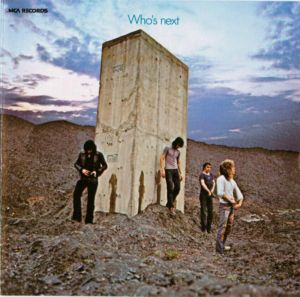
- Format: FLAC

Classic Records reissue
24bit-96kHz transfer of 200 gram vinyl pressing (for DVD burning)
Vinyl >> Music Hall MMF-5 turntable with Goldring G1012 cartridge & Music Hall Cruise Control speedbox >> Yamaha RX-570 Receiver (phono stage preamp) >> E-MU 0404 External soundcard {ASIO} (24Bit96kHz) >> Laptop
"Who's Next, regardless of what you may have been led to believe to the contrary, is neither the soundtrack of the realization of Pete Townshend's apparently-aborted Hollywood dream, the greatest live album in the history of the universe, nor a, shudder, rock opera, but rather an old-fashioned long-player containing intelligently-conceived, superbly-performed, brilliantly-produced, and sometimes even exciting rock and roll.
The musicianship is undisputably excellent, with Keith Moon thrashing and bashing more precisely than ever before on record, Entwistle dreaming up all manner of scrumptious melodic and rhythmic flourishes (listen especially to what he plays beneath the chorus of "Won't Get Fooled Again"), and Townshend, be it chunky acoustic rhythm, resounding monster chords of the classic sort, or cogent and lyrical soloes, playing with exemplary efficiency and taste.
As for the album's production, Townshend has, with the able assistance of Glyn Johns in the dual role of engineer and co-producer, come up with one of the most masterfully-recorded rock records in recent memory. Whether so precise a sound as this record's becomes the Who is, at this point, less relevant than the consideration that they've now satisfied their curiosity about whether or not they could be recorded as crisply as, say, Thunderclap Newman.
And with the long LP version of "Won't Get Fooled Again," an ingeniously-constructed panoramic view of methods of attack they've grown fondest of over the years, they've succeeded in committing to vinyl a comprehensive primer of basic Whostyle.
Such dynamics! The beautiful quietly lyrical moments of such selections as "The Song Is Over," "Gettin' In Tune," and "Behind Blue Eyes" are juxtaposed with the thundering rock that is the marrow of those songs so that each is rendered even more poignant.
To further frost the confection, Townshend wrings more than his money's worth out of his £14,000-worth of synthesizers, making, I daresay, shrewder -- at once more adventurous and better-integrated -- use of them than any rock experimenter before him.
In "Baba O'Riley," for instance, he sets the stage for the band's dramatic entrance with a pre-recorded VCS3 part he obtained by programming certain of his vital statistics into a computer hooked up to the synthesizer, then treats the part as a drone while the song's two major chords are transposed over it, and later has the band playing against it (that is, piling a few gigantic chords on it while it keeps going "Meep-meep-meep-meep-meep...") to lead into a solo by guest fiddler Dave Arbus.
Next, on "Bargain," he uses his ARP both as a solo instrument and as a backdrop to his own beautiful guitar solo.
There's just so much to be astonished and delighted by on this album once you get used to its kinda chilly perfection...
There's Roger Daltrey singing, "And I'm gonna 'chune' right in on you," during "Gettin' In Tune," which is so wonderous that it's enough to keep the listener's mind off the possibly unpleasant implications of "the straight and narrow" being what's been gotten in tune to.
There's Daltrey bestowing an excellent dramatic reading (note especially his intonation of the word "vengeance") on interesting lyrics in front of the prettiest Who harmonies in ever so long in "Behind Blue Eyes.
There's Imbecile's stupendously catchy and stupid "My Wife," which deals with the danger of being both married and fond of lazing about in the boozer until all hours. (What a pity that The Ox's pleasantly adenoidal voice is all but lost beneath the instruments -- "Can this be a result of jealousy on Townshend's part?" you'll long to know for sure).
And, ultimately, there is "The Song Is Over," one of a few survivors on Next from the recently-aborted Bobby project, an un-utterably beautiful song in which Townshend sings exquisitely over a gentle piano background before and in between Daltrey charging in exhilaratingly over a hard part while breathtaking chord changes in the manner of the "Listening to you I hear the music..." refrain from Tommy. Definitely up there with "Rael" and "Pinball Wizard" and "I'm The Face" among their very best work is this one.
And, just to make it clear to any cretins out there in Radioland that this is just a plain old-fashioned long-player, there are a couple of throwaways: The faintly pretty but negligible "Love Ain't For Keeping" (which most certainly does not deserve to succeed "Heaven And Hell" as the group's stage-opener, unless they play it live about ten trillion times harder than they do on record), and the faintly inane "Goin' Mobile," which celebrates the joys of, ho hum, being free to roam the highways and byways in one's trailer.
And there you have it, chums, an album that, despite a degree of sober calculatedness that would prove fatal to a lesser group, ranks right up there with David Bowie's and Black Oak Arkansas's and Crazy Horse's and Procol Harum's and Alice Cooper's and Christopher Milk's as among the most wondrous of 1971. In view of the fact that Pete's resumed smashing shit out of his guitar at the end of performances and that they've hopefully now resolved all their anxieties about technique, it's eminently reasonable to assume that subsequent Who albums won't be no shrinking violets either.
- John Mendolsohn, Rolling Stone, 9-2-71"